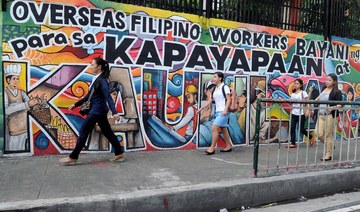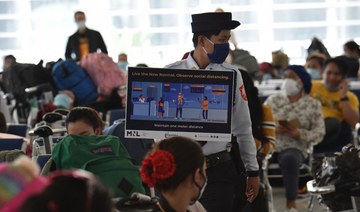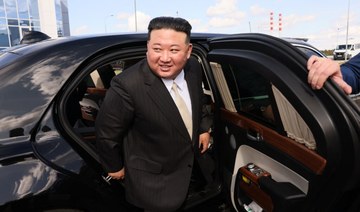MANILA: Philippine labor migration stakeholders welcomed on Friday the establishment of a new agency aimed at protecting the welfare of overseas Filipino workers — 2.2 million people who contribute billions of dollars to the country’s economy.
Referred to as “modern-day heroes,” the overseas workers are one of the main drivers behind the country’s economic growth. Their remittance inflows account for nearly 10 percent of Philippine GDP.
In 2021 alone, overseas Filipino workers, or OFWs, contributed $28.8 billion to the Philippine economy, according to the country’s central bank.
A bill establishing the new agency, the Department of Migrant Workers, was signed into law by President Rodrigo Duterte into law on Thursday, coinciding with Rizal Day — a Philippine national holiday commemorating 19th-century physician and man of letters José Rizal, who was an inspiration to the Philippine nationalist movement and is regarded as one of the country’s national heroes.
The new department is a fulfillment of Duterte’s 2016 presidential campaign promise to consolidate all relevant agencies to streamline government services and assistance for OFWs.
“With their own department to take care of their needs and protection, OFWs expect a more conscious and unified approach in advancing migrant rights and interest,” the Philippine Ambassador to Saudi Arabia Adnan Alonto told Arab News.
As the most preferred destination among Filipino migrant workers, Saudi Arabia will be the site to test the effectiveness of the new agency.
“As home to almost one million overseas workers, KSA (Kingdom of Saudi Arabia) will be the main situs to the law’s implementation and effectiveness,” Alonto said.
Foreign Affairs Undersecretary Sarah Lou Arriola told reporters the creation of the department reflects the country’s commitment to establishing a landmark migration management system in accordance with the 2018 Global Compact for Safe, Orderly, and Regular Migration, known as GCM.
The GCM is an intergovernmental agreement under the auspices of the UN to cover all dimensions of international migration, including the protection of labor migrants.
“We’re the first country in the world to enact this. We are a trailblazer and it’s the first law in the world that has the GCM in its policy,” Arriola said.
“We are very happy because this is a victory for our OFWs who lobbied for this law for close to more than five years, since the beginning of the Duterte administration.”
Raymond Mendoza, principal author of the Department of Migrant Workers bill and president of the Trade Union Congress of the Philippines, said in a statement to Arab News that all the needs of OFWs will be taken care of under the newly created agency.
“One department means that there will be harmonization of programs and the removal of unnecessary requirements that incentivize fixers and illegal recruiters. We now remove the paper chase for various transactions and needed assistance from one agency to another,” he said.
“In addition, the law provides for clear parameters for ethical recruitment, which is the lawful hiring of OFWs in a fair and transparent manner that respects and protects their dignity and human rights.”
But the creation of the new department has also attracted criticism.
Migrante International, a global alliance of OFWs, said on social media the department could create “more confusion” among workers, adding that there are fears that the budget will prioritize administration over legal and welfare services.
Migrante International representatives were not available for comment.
Kanlungan Center Foundation, a non-profit organization dedicated to the rights of migrant workers, expressed hope that the new agency will address labor migration issues, such as abuse and wage theft.
“We look forward and will continue to assert that the interest and welfare of all migrants should (be) the paramount concern of the new department and that the services and assistance that the migrants need will be provided at all times, and that full protection of labour must be upheld,” Kanlungan told Arab News.
The group added it was hopeful that those appointed to manage the department will “have a track record of upholding the rights of migrant workers and their families.”


























